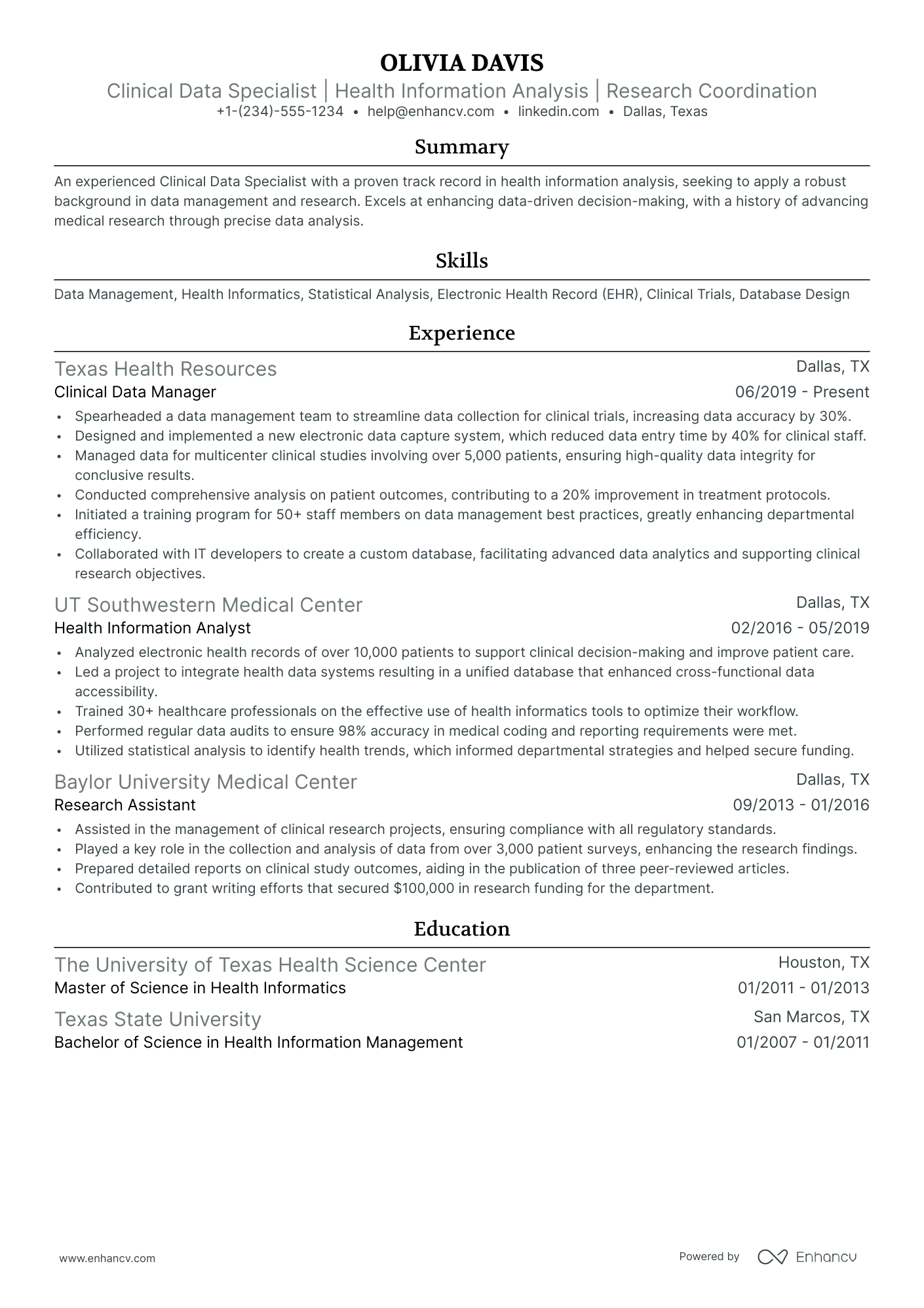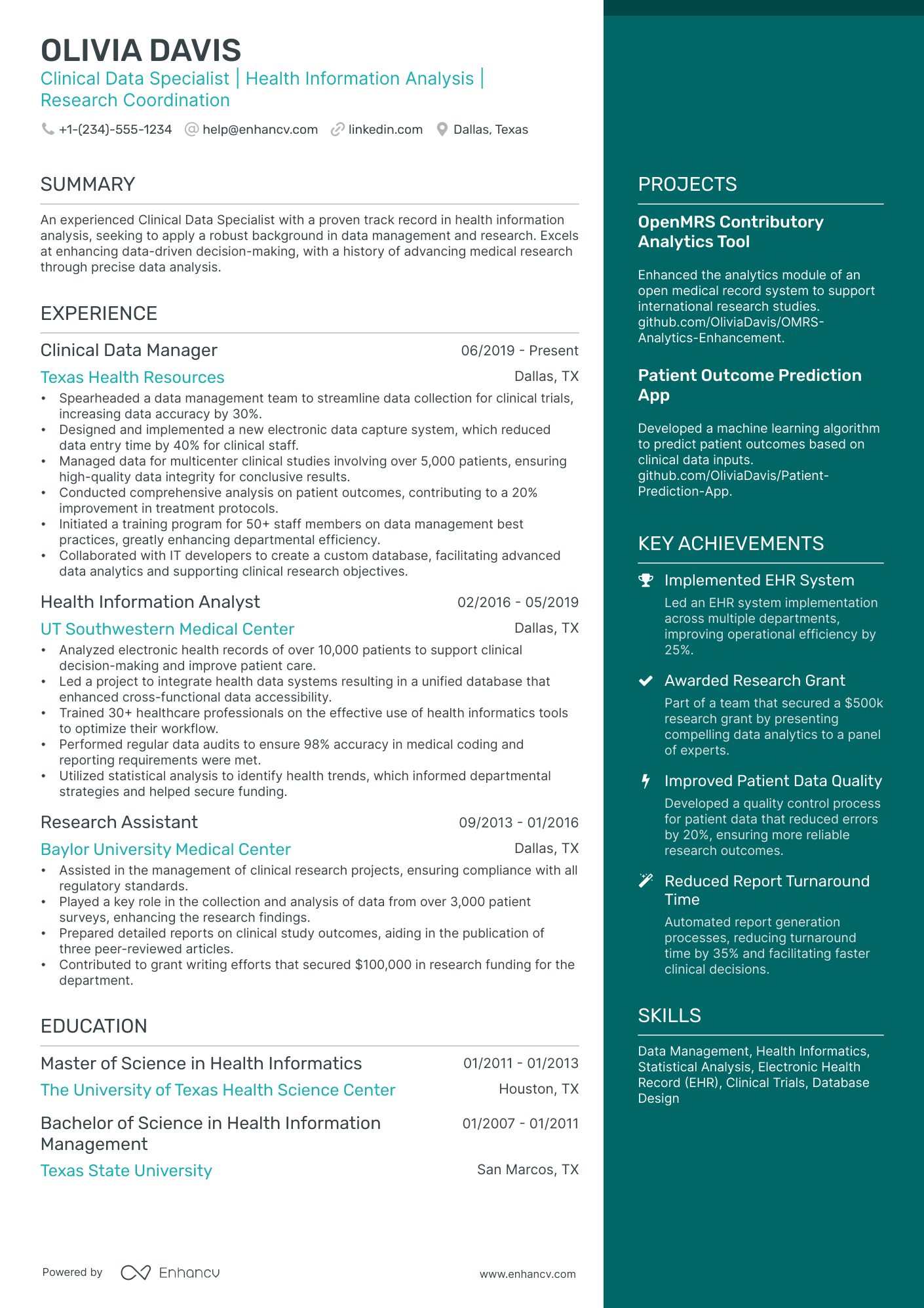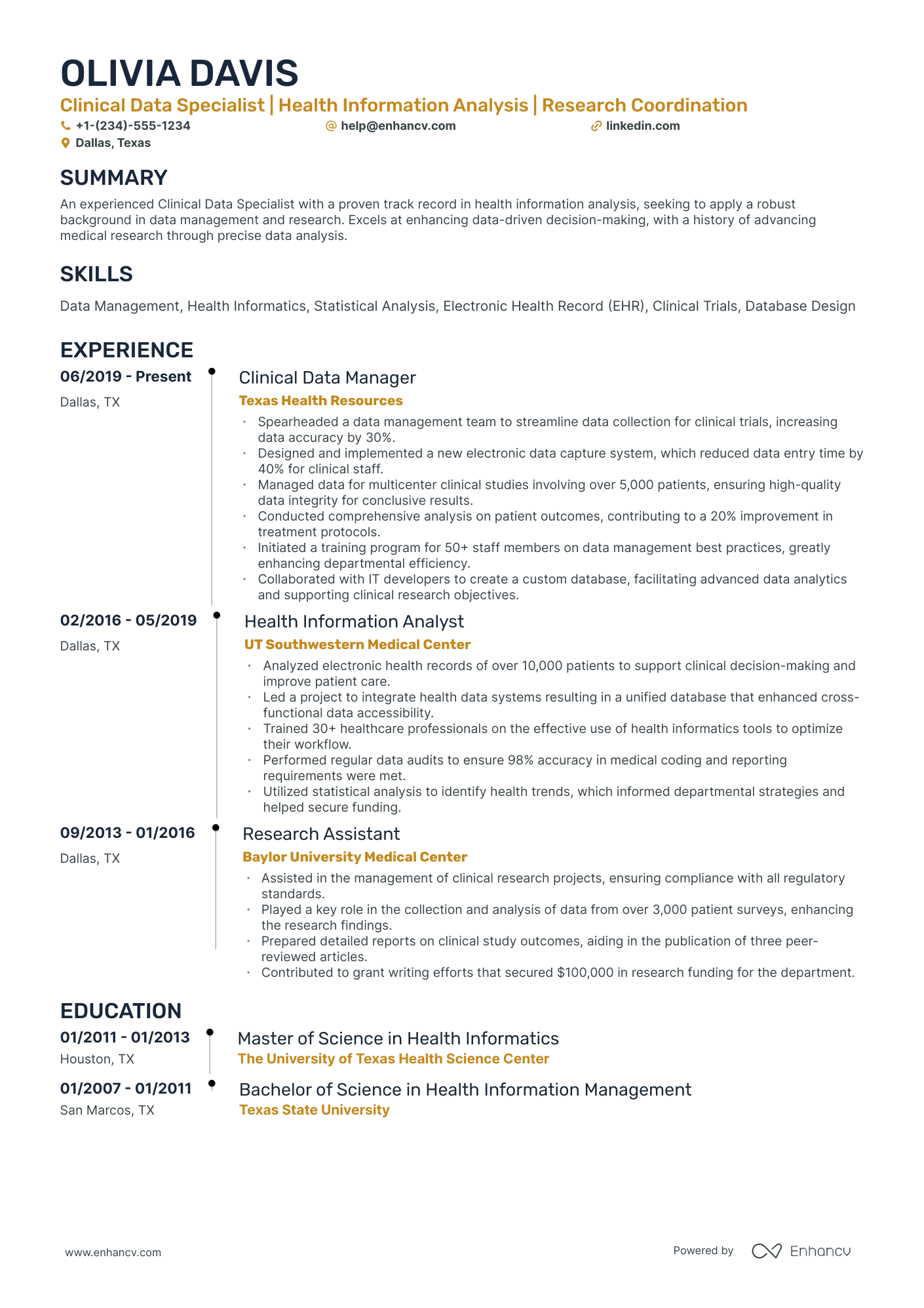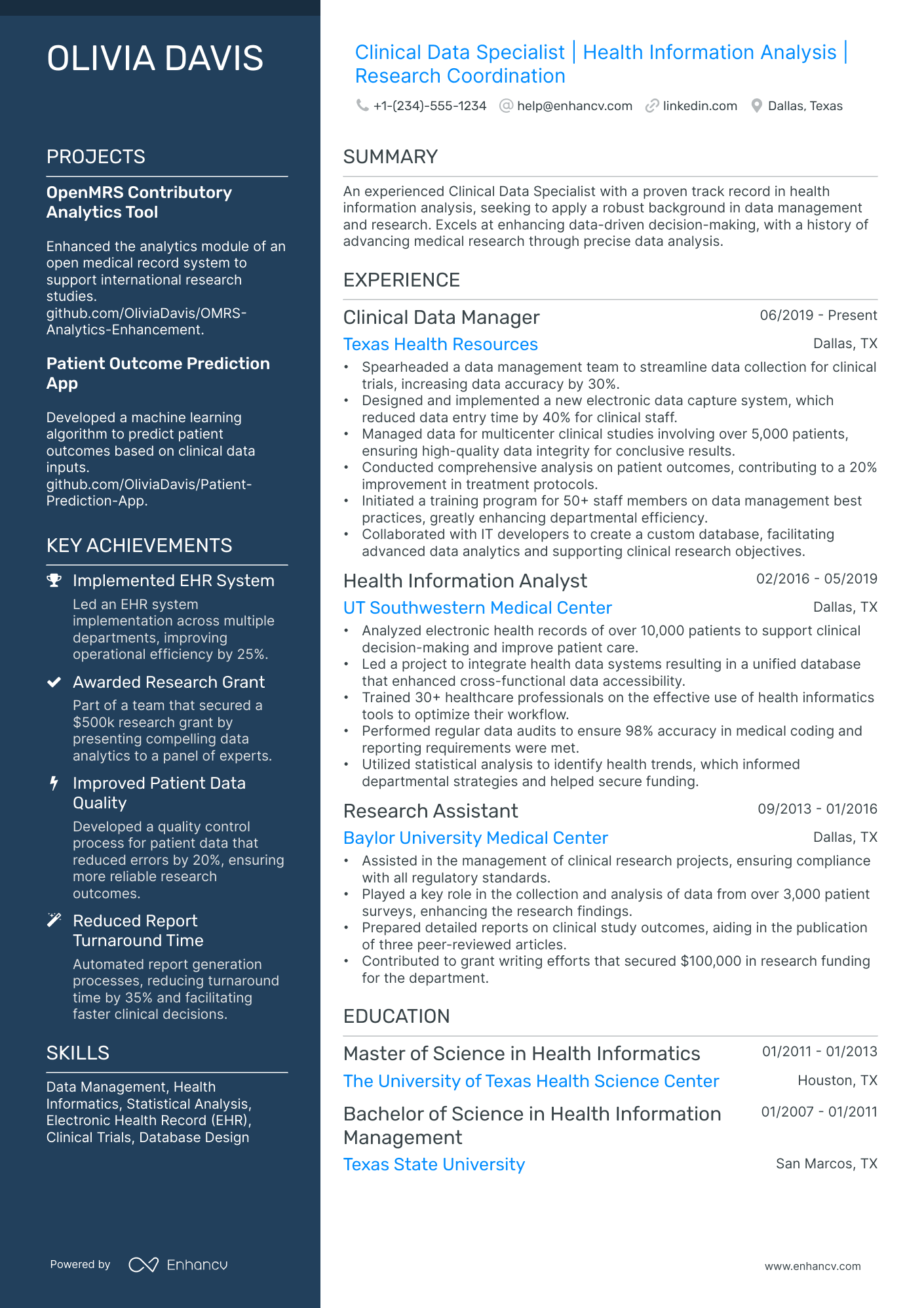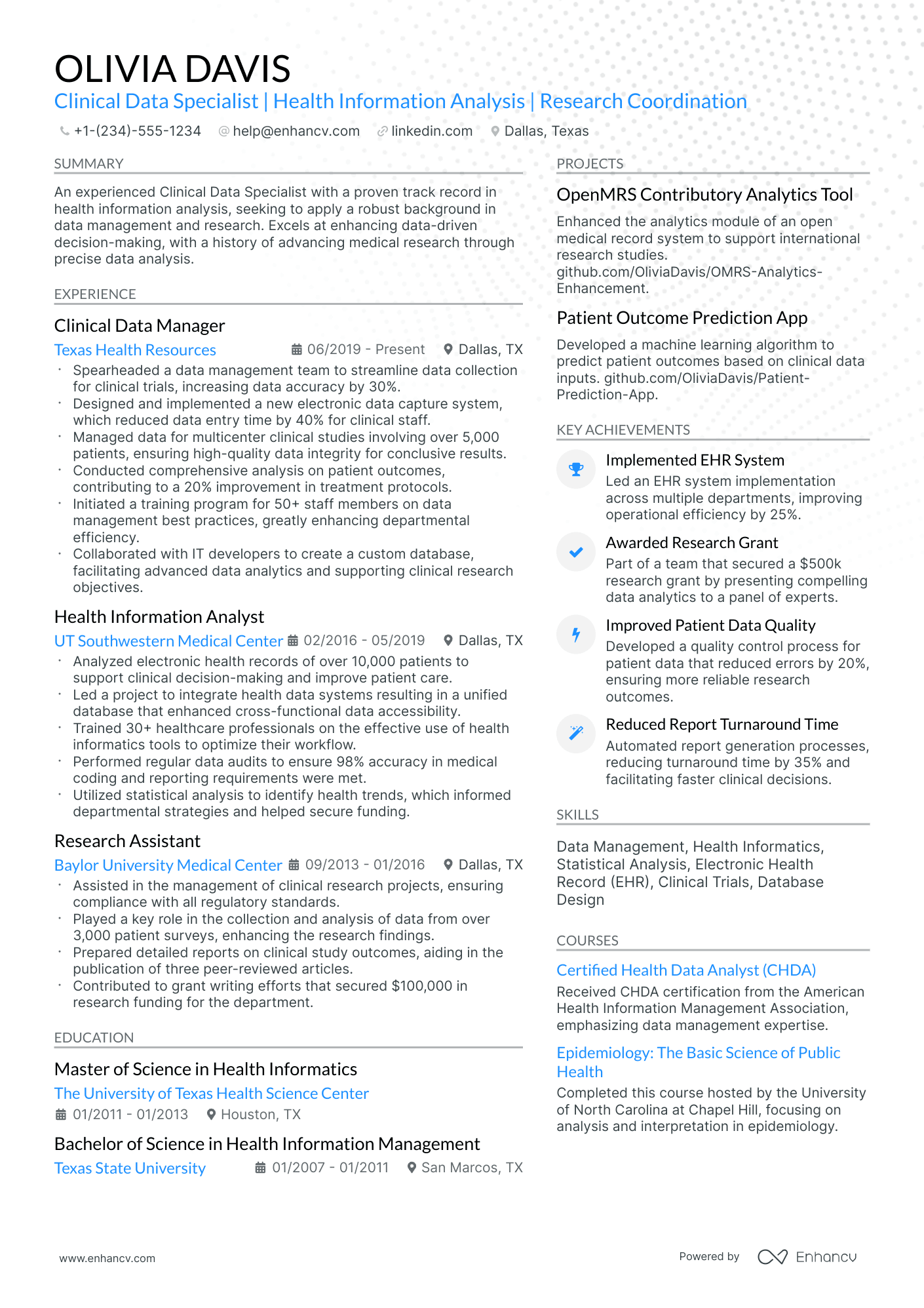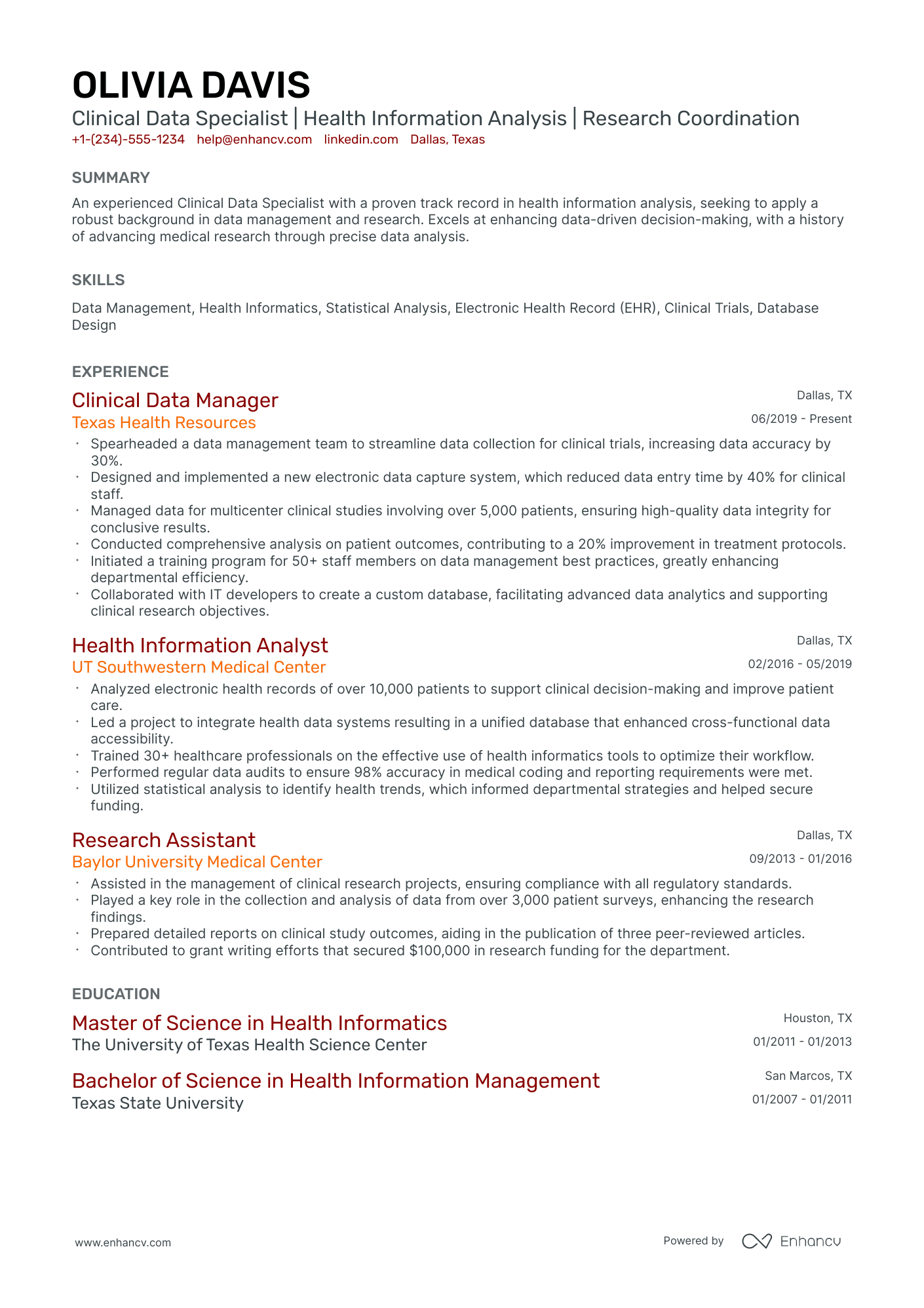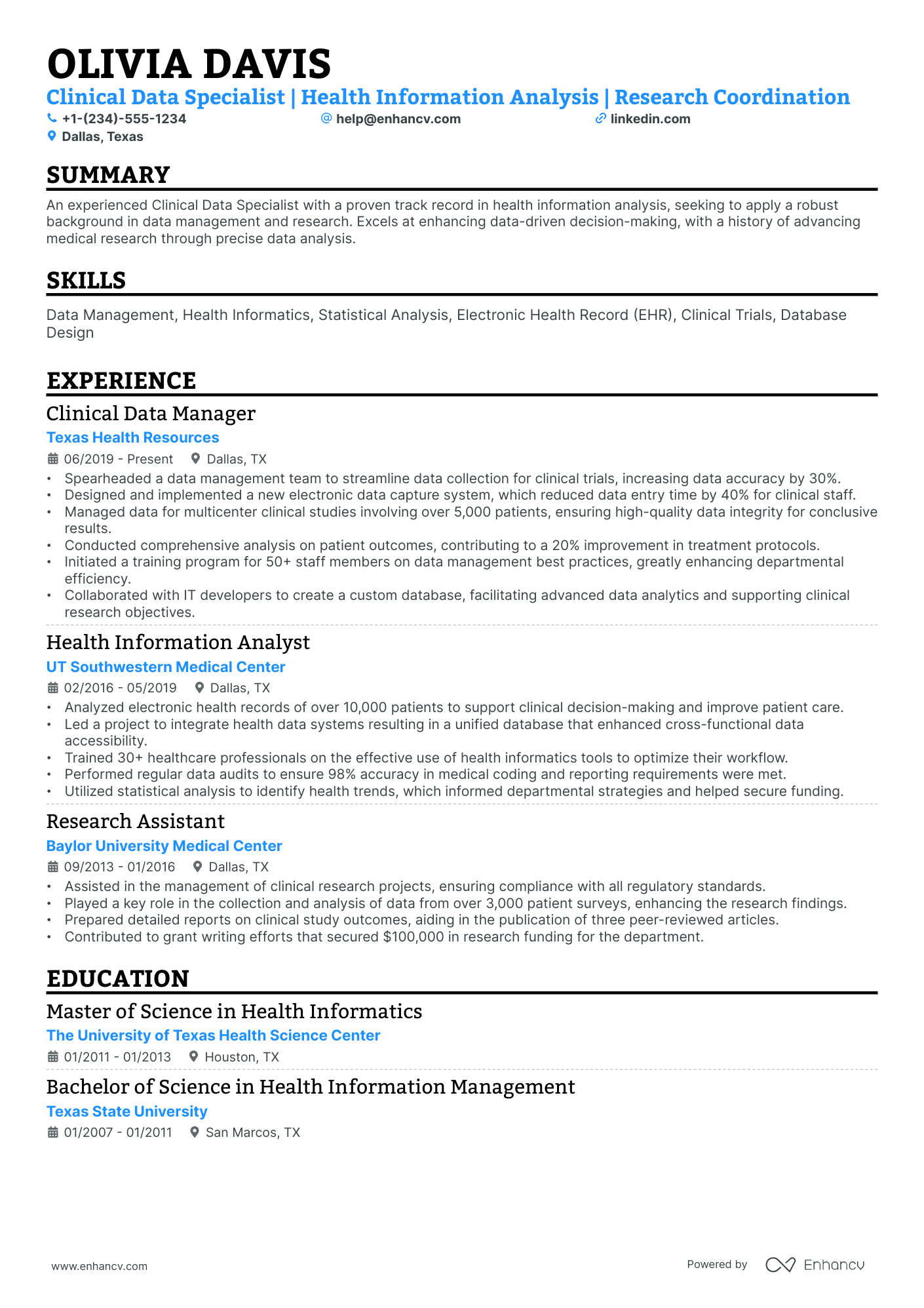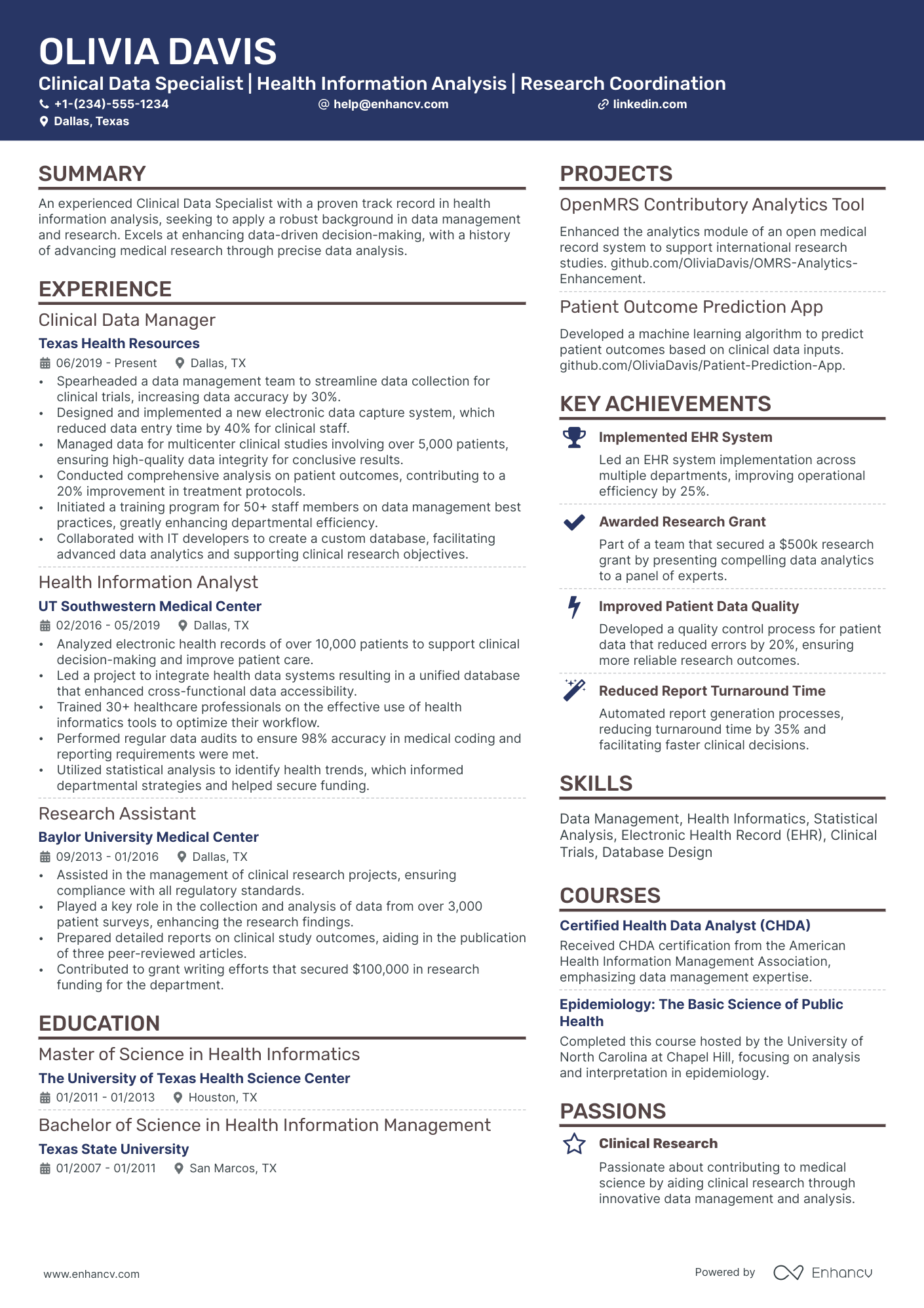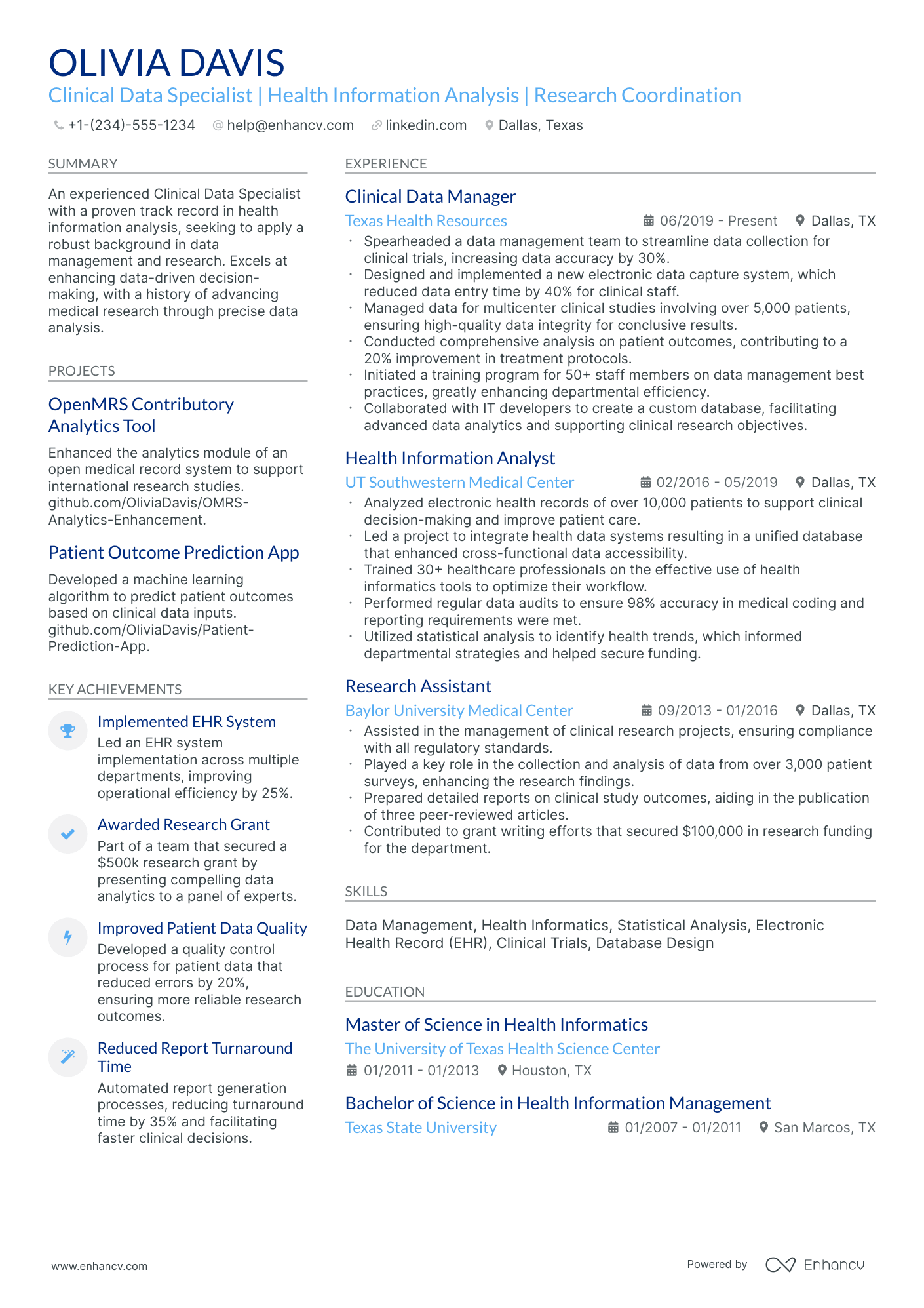As a clinical data analyst, articulating the depth of your technical skills on a resume can be a challenge when trying to match industry-specific jargon with the language used in job descriptions. Our guide will provide you with the tools to effectively bridge this gap, ensuring that your expertise is clearly communicated and aligned with the expectations of potential employers.
- Defining the highlights of your clinical data analyst career through your resume summary, objective, and experience.
- Real-world clinical data analyst resume samples with best practices on how to stand out amongst the endless pile of candidate resumes.
- Most in-demand clinical data analyst resume skills and certifications across the industry.
- Standardizing your resume layout, while maintaining your creativity and individuality.
If the clinical data analyst resume isn't the right one for you, take a look at other related guides we have:
- GCP Data Engineer Resume Example
- Enterprise Data Architect Resume Example
- Database Assistant Resume Example
- Data Warehouse Consultant Resume Example
- Data Center Technician Resume Example
- Database Manager Resume Example
- Data Entry Clerk Resume Example
- Data Management Analyst Resume Example
- Statistical Data Analyst Resume Example
- Data Center Engineer Resume Example
Don't stress out over your clinical data analyst resume format
Remember, the elaborate design of your clinical data analyst resume isn't what impresses recruiters most. They are primarily searching for candidates who meet the job requirements. The main aim of your resume should be to clearly and concisely explain why employers should hire you.
Here are four straightforward steps to consider in your clinical data analyst resume design:
- Organize your resume based on experience: Start with your most recent roles. Besides using reverse chronological order, choose jobs relevant to the position you're applying for.
- Include your contact details (and portfolio or LinkedIn link) in your resume's header to ensure recruiters can easily reach you. If considering adding a professional photo, check acceptable practices in different countries first.
- Don't omit essential clinical data analyst resume sections such as the summary or objective, experience, and education. These sections should reflect your career progression and align with job requirements.
- Maintain conciseness in your resume. For those with less than ten years of experience, a one-page format is advisable.
Regarding the format to submit your clinical data analyst resume, PDF is preferable. PDFs are more likely to maintain their formatting when processed through recruitment software or ATS, saving you time in the application process.
When selecting a font for your clinical data analyst resume, consider the following:
- Choose ATS-friendly fonts such as Exo 2, Volkhov, Lato, etc., to keep your resume's content legible;
- All serif and sans-serif fonts are easily readable by ATS;
- While Arial and Times New Roman are common choices, opting for unique typography can help your resume stand out.
Concerned about ATS compatibility with charts and infographics? Our recent study has debunked this and other myths.
Align your resume with the market’s standards – Canadian resumes may have unique layout guidelines.
Upload & Check Your Resume
Drop your resume here or choose a file. PDF & DOCX only. Max 2MB file size.
PRO TIP
If you happen to have plenty of certificates, select the ones that are most applicable and sought-after across the industry. Organize them by relevance to the role you're applying for.
The five (plus) definite sections your resume for a clinical data analyst job should include are:
- Header with your headline, contact details, and/or a preview of your work
- Summary (or objective) to pinpoint how your success aligns with the role
- Experience with bullets of your most relevant achievements in the field
- Skills to integrate vital job requirements (both technical and personal)
- Your further dedication to the field, showcased via relevant higher education and/or certifications
What recruiters want to see on your resume:
- Proficiency in clinical data management systems (CDMS) such as Medidata Rave, Oracle Clinical, or REDCap.
- Experience with statistical software and programming languages such as SAS, R, Python or SQL for data analysis and report generation.
- Familiarity with healthcare standards and regulations, including HIPAA, FDA, and ICH GCP guidelines specific to clinical data integrity and confidentiality.
- Demonstrated skills in data validation, cleaning, and discrepancy management to ensure the accuracy and completeness of clinical trial data.
- Knowledge of the clinical trial process and the role of data in the development and approval of drugs and medical devices.
What is the resume experience section and how to write one for your past roles
The experience section in a clinical data analyst resume is critical for your profile and overall application. It should not only display your work history, but also highlight your achievements in previous roles.
Many candidates either simply list their duties or provide excessive details about past, irrelevant jobs. A more effective approach involves first examining the job advertisement for keywords - specifically, skills essential for the role. Then, demonstrate these key requirements throughout different parts of your resume, using accomplishments from your roles.
Format each bullet point in your experience section by starting with a strong action verb. Follow this with a description of your role and its impact on the team or organization.
Aim to include three to five bullet points for each role.
Finally, gain insights into how professionals have crafted their clinical data analyst resume experience sections by exploring some best practice examples.
- Architected and implemented a comprehensive data validation system which reduced data discrepancies by 30% across all ongoing clinical trials.
- Orchestrated the migration of legacy clinical datasets to a modernized data warehouse, improving data retrieval times by 50%.
- Designed, developed, and deployed a dynamic reporting dashboard that provided real-time analytics to cross-functional teams, facilitating data-driven decision-making.
- Managed data acquisition and curation from over 25 multi-center clinical trials, enhancing the integrity and quality of the trial datasets.
- Led the development of a clinical data monitoring plan that improved the identification of outliers and anomalies by 40%.
- Collaborated with biostatisticians to develop sophisticated data models that effectively predicted patient outcomes, influencing trial design.
- Led a team of 5 analysts in data scrubbing operations which enhanced data accuracy for a pivotal Phase III clinical trial.
- Deployed advanced statistical techniques that helped uncover novel insights into patient responses, which were published in a top-tier medical journal.
- Spearheaded a cross-department workflow optimization project that increased overall productivity by 25%.
- Implemented a standardized data entry protocol that reduced entry errors by 20% within the first 6 months.
- Contributed to a major data analysis project that successfully identified three potential biomarkers for targeted drug therapy.
- Trained 10 new hires in data validation techniques, significantly increasing the department's operational efficiency.
- Assisted in the design of electronic Case Report Forms (eCRFs) that streamlined data collection for a multi-national clinical study with 10,000+ participants.
- Played a key role in the audit preparation process that led to a successful FDA inspection with zero major findings.
- Conducted thorough data cleaning processes that contributed to the high-quality dataset submissions for regulatory review.
- Directed a successful data migration project for patient registries which reduced future data mapping and integration efforts by 35%.
- Initiated a department-wide upskilling program in machine learning that empowered data analysts to automate routine data curation tasks, saving approximately 260 man-hours per year.
- Enhanced stakeholder reporting frameworks through the incorporation of interactive visualizations, significantly improving the narrative of clinical data outcomes.
- Championed the use of artificial intelligence to model patient enrollment patterns, improving forecasting accuracy for trial completion dates by over 15%.
- Developed a proprietary code set for data anomaly detection which was adopted across various projects, resulting in a marked reduction in data reconciliation efforts.
- Mentored a team of junior analysts in advanced data visualization techniques, enhancing the quality and comprehensibility of data reports.
- Designed and developed an automated adverse event reporting system that reduced the time from event capture to reporting by 60%.
- Facilitated several cross-functional meetings to gather user requirements and ensure the deployment of systems that met all departmental needs.
- Conducted comprehensive system testing, leading to the timely launch of a new clinical database system which supported over 500 users.
The following content includes information from "O*NET OnLine" by the U.S. Department of Labor, Employment and Training Administration (USDOL/ETA). Used under the CC BY 4.0 license. The data represents the top responsibilities present on the task lists for clinical data analyst professionals.
Top Responsibilities for Clinical Data Analyst:
- Design and validate clinical databases, including designing or testing logic checks.
- Process clinical data, including receipt, entry, verification, or filing of information.
- Generate data queries, based on validation checks or errors and omissions identified during data entry, to resolve identified problems.
- Develop project-specific data management plans that address areas such as coding, reporting, or transfer of data, database locks, and work flow processes.
- Monitor work productivity or quality to ensure compliance with standard operating procedures.
- Prepare appropriate formatting to data sets as requested.
- Design forms for receiving, processing, or tracking data.
- Prepare data analysis listings and activity, performance, or progress reports.
- Confer with end users to define or implement clinical system requirements such as data release formats, delivery schedules, and testing protocols.
- Perform quality control audits to ensure accuracy, completeness, or proper usage of clinical systems and data.
Quantifying impact on your resume
- Highlight the volume of clinical data you have managed or analyzed to demonstrate your ability to handle large and complex data sets.
- Quantify the number of clinical studies or trials you've supported, showcasing your experience and industry knowledge.
- Specify the statistical methods and data analysis techniques you have mastered, and how often you have applied them in a clinical context.
- Detail the percentage of efficiency or accuracy improvements in data processing or analysis you've achieved in past roles.
- Present the amount of cost savings or revenue generated from data-driven decisions or optimizations you have contributed to.
- Mention the number of data visualization projects you've completed, indicating your ability to communicate complex data insights effectively.
- Enumerate any awards, recognitions, or certifications you have received that are relevant to clinical data analysis.
- Report on the number of collaborative projects with cross-functional teams, illustrating your teamwork and communication skills.
Action verbs for your clinical data analyst resume
Making the most of your little to none professional experience
If you're hesitant to apply for your dream job due to limited professional experience, remember that recruiters also value the unique contributions you can offer.
Next time you doubt applying, consider this step-by-step approach for your resume's experience section:
- Rather than the standard reverse chronological order, opt for a functional-based format. This shifts the focus from your work history to your achievements and strengths;
- Include relevant internships, volunteer work, or other non-standard experiences in your clinical data analyst resume's experience section;
- Utilize your education, qualifications, and certifications to bridge gaps in your clinical data analyst resume experience;
- Emphasize your interpersonal skills and transferable skills from various industries. Often, recruiters seek a personality match, giving you an advantage over other candidates.
Recommended reads:
PRO TIP
Showcase any ongoing or recent educational efforts to stay updated in your field.
How to showcase hard skills and soft skills on your resume
Reading between the lines of your dream job, you find recruiters are looking for candidates who have specific software or hardware knowledge, and personal skills.
Any technology you're adept at shows your hard skills. This particular skill set answers initial job requirements, hinting at how much time your potential employers would have to invest in training you. Showcase you have the relevant technical background in your communicate, solve problems, and adapt to new environments. Basically, your interpersonal communication skills that show recruiters if you'd fit into the team and company culture. You could use the achievements section to tie in your greatest wins with relevant soft skills.
It's also a good idea to add some of your hard and soft skills across different resume sections (e.g. summary/objective, experience, etc.) to match the job requirements and pass the initial screening process. Remember to always check your skill spelling and ensure that you've copy-pasted the name of the desired skills from the job advert as is.
Top skills for your clinical data analyst resume:
SQL
SAS
R
Python
Excel
Tableau
Clinical Trial Management Systems (CTMS)
Electronic Data Capture (EDC)
Statistical Analysis Software
Data Visualization Tools
Analytical Thinking
Attention to Detail
Problem-Solving
Communication
Team Collaboration
Time Management
Adaptability
Critical Thinking
Organizational Skills
Interpersonal Skills
Next, you will find information on the top technologies for clinical data analyst professonals from "O*NET OnLine" by the U.S. Department of Labor, Employment and Training Administration (USDOL/ETA). Used under the CC BY 4.0 license.
Top technologies for Clinical Data Analyst’s resume:
- Microsoft Access
- Structured query language SQL
- Microsoft PowerPoint
- IBM SPSS Statistics
- SAS
PRO TIP
If you happen to have some basic certificates, don't invest too much of your clinical data analyst resume real estate in them. Instead, list them within the skills section or as part of your relevant experience. This way you'd ensure you meet all job requirements while dedicating your certificates to only the most in-demand certification across the industry.
The importance of your certifications and education on your clinical data analyst resume
Pay attention to the resume education section . It can offer clues about your skills and experiences that align with the job.
- List only tertiary education details, including the institution and dates.
- Mention your expected graduation date if you're currently studying.
- Exclude degrees unrelated to the job or field.
- Describe your education if it allows you to highlight your achievements further.
Your professional qualifications: certificates and education play a crucial role in your clinical data analyst application. They showcase your dedication to gaining the best expertise and know-how in the field. Include any diplomas and certificates that are:
- Listed within the job requirements or could make your application stand out
- Niche to your industry and require plenty of effort to obtain
- Helping you prepare for professional growth with forward-facing know-how
- Relevant to the clinical data analyst job - make sure to include the name of the certificate, institution you've obtained it at, and dates
Both your certificates and education section need to add further value to your application. That's why we've dedicated this next list just for you - check out some of the most popular clinical data analyst certificates to include on your resume:
The top 5 certifications for your clinical data analyst resume:
- Certified Health Data Analyst (CHDA) - American Health Information Management Association (AHIMA)
- Certified Professional in Healthcare Information and Management Systems (CPHIMS) - Healthcare Information and Management Systems Society (HIMSS)
- Registered Health Information Administrator (RHIA) - American Health Information Management Association (AHIMA)
- Certified Clinical Data Manager (CCDM) - Society for Clinical Data Management (SCDM)
- Project Management Professional (PMP) - Project Management Institute (PMI)
The content below includes information from "O*NET OnLine" by the U.S. Department of Labor, Employment and Training Administration (USDOL/ETA). Used under the CC BY 4.0 license. The data represents the top associations for clinical data analyst professionals.
Top US associations for a Clinical Data Analyst professional
- American Medical Informatics Association
- American Association of Pharmaceutical Scientists
- American Clinical Neurophysiology Society
- American Health Information Management Association
- American Society of Clinical Oncology
PRO TIP
List your educational qualifications and certifications in reverse chronological order.
Recommended reads:
Practical guide to your clinical data analyst resume summary or objective
First off, should you include a summary or objective on your clinical data analyst resume?
We definitely recommend you choose the:
- Resume summary to match job requirements with most noteworthy accomplishments.
- Resume objective as a snapshot of career dreams
Both the resume summary and objective should set expectations for recruiters as to what your career highlights are.
These introductory paragraphs (that are no more than five sentences long) should help you answer why you're the best candidate for the job.
Industry-wide best practices pinpoint that the clinical data analyst resume summaries and objectives follow the structures of these samples:
Resume summaries for a clinical data analyst job
- Seasoned clinical data analyst with over 8 years of experience in processing and analyzing vast datasets within the healthcare sector. Specialized in statistical analysis using SAS and R, adept in database management with a track record of improving patient outcomes by transforming raw data into actionable insights for a leading healthcare provider.
- Energetic professional with a strong background in biostatistics and 5 years dedicated to clinical research data analysis at a renowned oncology center. With expertise in Python, SQL, and data visualization, drove a 20% increase in operational efficiency by optimizing data systems integrations and reporting protocols.
- With a decade of experience as a biomedical researcher, I am now transitioning to clinical data analysis, bringing a wealth of knowledge in experimental design and scientific method. Proficient in utilizing MATLAB and Tableau for data interpretation and eager to leverage these skills to contribute to large-scale clinical data projects.
- Professional with 6 years of experience in financial data analytics looking to pivot into the clinical data field. Equipped with a mastery of Excel, Power BI, and a solid foundation in statistical analysis, I am eager to apply my analytical skill set to support healthcare data initiatives and clinical trial advancements.
- Aspiring clinical data analyst with a recent Master’s in Health Informatics, driven to embark on a data-driven career path. Eager to apply theoretical knowledge in clinical database management and predictive analytics to uncover insights that enhance patient care and support healthcare innovation.
- Recent graduate with honors in Health Information Management, aiming to leverage my robust academic foundation in EHR systems, medical coding, and data quality assurance in a clinical data analyst capacity. Committed to lifelong learning and passionate about contributing to data-driven healthcare solutions.
Average salary info by state in the US for clinical data analyst professionals
Local salary info for Clinical Data Analyst.” Source: My Next Move, National Center for O*NET Development. Accessed 10/15/2024
| State | Average Salary (in USD) |
|---|---|
| US National Average | $108,020 |
| California (CA) | $133,690 |
| Texas (TX) | $100,100 |
| Florida (FL) | $95,360 |
| New York (NY) | $128,890 |
| Pennsylvania (PA) | $97,260 |
| Illinois (IL) | $108,580 |
| Ohio (OH) | $97,070 |
| Georgia (GA) | $100,950 |
| North Carolina (NC) | $126,940 |
| Michigan (MI) | $90,750 |
Extra clinical data analyst resume sections and elements
Creating a winning clinical data analyst resume isn't about following a rigid formula. The key is to tailor it to the job requirements while maintaining your unique personality.
Consider including these additional resume sections to enhance your profile:
- Awards - Highlight industry-specific awards as well as any personal accolades to demonstrate recognition of your expertise and achievements;
- Hobbies and interests - Share your interests outside of work. This can provide insights into your personality and indicate whether you'd be a good cultural fit for the organization;
- Projects - Detail significant projects you've been involved in, focusing on your contributions and the outcomes;
- Publications - If you've authored or co-authored academic papers or other publications, include them to establish your credibility and in-depth knowledge of the field.
These sections can give a more comprehensive view of your capabilities and character, complementing the standard resume content.
Key takeaways
Securing your ideal job starts with crafting a compelling clinical data analyst resume. It should not only highlight your professional strengths but also reflect your personality. Key aspects to remember include:
- Choose a clear, easily editable format, allowing more time to focus on the content of your resume;
- Emphasize experience relevant to the job, focusing on your impact on the team;
- Opt for a resume summary if you have extensive professional experience, and a resume objective if you're just starting out;
- Include technical skills in the skills section and interpersonal skills in the achievements section;
- Recognize the importance of various resume sections (e.g., My Time, Projects) in showcasing both your professional abilities and personal traits.
